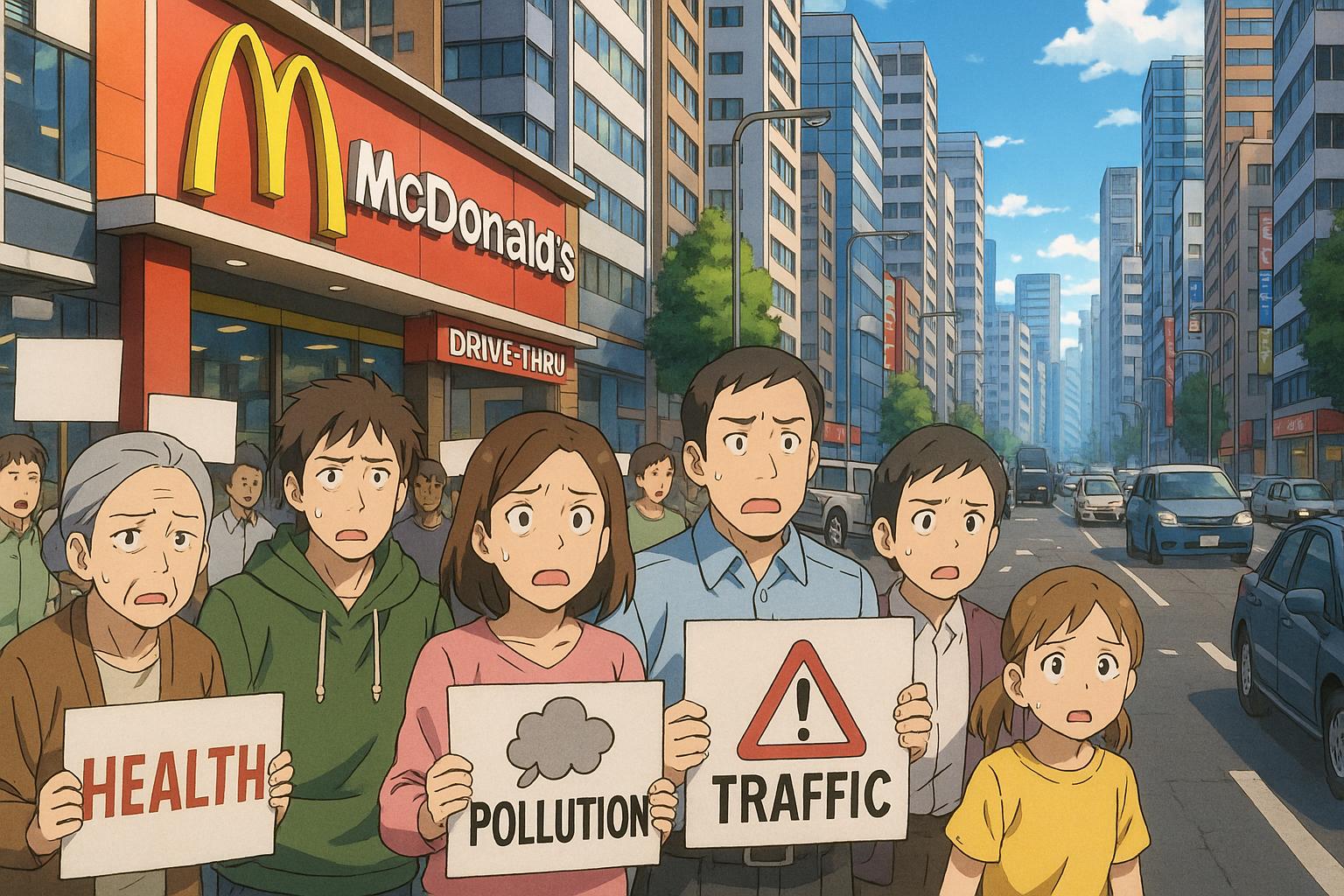The director of public health at Brighton and Hove City Council has recommended refusing a new 24-hour McDonald’s drive-through on Old Shoreham Road, citing the city’s high obesity rates, environmental impact, and traffic safety issues. Community opposition highlights the tension between urban development and public wellbeing in an area already saturated with fast-food outlets.
The proposal for a 24-hour McDonald’s drive-through on Old Shoreham Road in Hove has been met with a significant recommendation for refusal from the director of public health at Brighton and Hove City Council. This decision stems from growing health concerns in a city already burdened by high obesity rates, particularly as Hove has the highest density of fast-food outlets in the South East, standing at 149 per 100,000 residents.
In his response to the proposed development, the director indicated that granting permission would contradict the council’s commitment to enhanced health and wellbeing among residents. It is noteworthy that the area surrounding the proposed site is already among the most deprived in the city, with higher levels of obesity reported. This geographical juxtaposition raised alarms about the accessibility of unhealthy food options in communities that are statistically more vulnerable to obesity-related issues.
Concerns have also emerged regarding the environmental impact of the drive-through, particularly in relation to air quality. Nearing its culmination, a local protest organized by residents is scheduled for June 17, exemplifying grassroots opposition to the McDonald’s proposal. Community members have expressed worries not only about obesity but also about increased traffic congestion and pollution, which could exacerbate existing issues in an area where roads already experience high volumes, with Old Shoreham Road accommodating up to 28,000 vehicles daily.
The proposed design foresees potential traffic disruptions, including queues that might extend back onto Old Shoreham Road, a concern echoed by a highways and transport expert who has raised flags about traffic safety—specifically regarding an “uncontrolled pedestrian crossing” near the site, which could pose dangers to local school children given its proximity to at least four educational institutions. Parents have voiced apprehensions about the safety of their children against an anticipated uptick in vehicular traffic associated with the drive-through.
Further context can be gleaned from national trends in public health and fast-food development. Similar opposition to McDonald’s outlets has been documented elsewhere, such as in Thanet, where a proposal for a fifth outlet heightened fears of worsening obesity rates, with local surveys indicating that 60% of residents oppose the new branch. Critics argue that large fast-food chains are undermining local health initiatives, especially those aimed at curbing the proliferation of fast-food venues amid rising obesity levels.
Moreover, McDonald’s has faced allegations of imposing aggressive tactics in response to such refusals, with claims that the company has successfully appealed against planning rejections based on its promotion of healthier menu items. In a climate where public health advocates are fighting to enhance access to nutritious food choices, the pushback against the Hove drive-through shines a light on the broader challenges inherent in urban planning and fast-food expansion.
With an effort to foster healthier communities, cities across the globe are reassessing their regulations around fast food and its implications for public health, traffic, and environmental sustainability. Instances like the one in Hove illustrate the ongoing tug-of-war between economic development aspirations and community health priorities, signalling a growing public sentiment favouring healthier alternatives over fast-food accessibility.
 Reference Map:
Reference Map:
Source: Noah Wire Services
- https://www.theargus.co.uk/news/25226315.experts-say-hove-mcdonalds-drive-thru-refused/ – Please view link – unable to able to access data
- https://www.theguardian.com/society/2025/feb/05/mcdonalds-accused-of-tough-tactics-councils-new-branches – McDonald’s has been accused of employing aggressive tactics to overturn council decisions blocking new outlets. The company has successfully appealed against planning refusals by highlighting its healthier menu options and community involvement. Since 2020, McDonald’s has lodged 14 appeals, winning 11, leading to the opening of 24-hour branches and increased signage. Critics argue that these strategies undermine local authorities’ efforts to control fast-food proliferation and address public health concerns. ([theguardian.com](https://www.theguardian.com/society/2025/feb/05/mcdonalds-accused-of-tough-tactics-councils-new-branches?utm_source=openai))
- https://www.kentonline.co.uk/thanet/news/we-dont-need-a-fifth-mcdonalds-too-many-people-are-alre-310055/ – A proposal for a fifth McDonald’s in Thanet has sparked public concern due to high obesity rates in the area. Nearly 70% of residents are classified as overweight or obese. The new drive-thru would be within five miles of existing McDonald’s outlets, leading to fears of exacerbating health issues. A public consultation revealed that 60% of respondents oppose the plan, citing the need for healthier food options. ([kentonline.co.uk](https://www.kentonline.co.uk/thanet/news/we-don-t-need-a-fifth-mcdonald-s-too-many-people-are-alre-310055/?utm_source=openai))
- https://feeds.bbci.co.uk/news/articles/cj3e6yrl5nlo – Residents in Hove have objected to a McDonald’s proposal to build a new diner and drive-through on Old Shoreham Road. Concerns include the proximity to three secondary schools and several primary schools, as well as existing traffic issues at the junction. McDonald’s plans to invest millions in the new premises, creating 120 full and part-time jobs. The company has proposed a ‘fast forward’ lane to improve traffic flow. ([feeds.bbci.co.uk](https://feeds.bbci.co.uk/news/articles/cj3e6yrl5nlo?utm_source=openai))
- https://amp.cnn.com/cnn/2023/06/24/business/drive-thru-fast-food-chick-fil-a-urban-planning/index.html – Drive-thru restaurants are causing urban planning challenges, leading to increased traffic congestion and safety concerns. Cities like Atlanta and Minneapolis have considered banning new drive-thrus to promote walkability and reduce accidents. Critics argue that drive-thrus discourage walking and public transit use, and contribute to environmental issues. Urban planners advocate for designs that support vibrant, pedestrian-friendly communities. ([amp.cnn.com](https://amp.cnn.com/cnn/2023/06/24/business/drive-thru-fast-food-chick-fil-a-urban-planning/index.html?utm_source=openai))
- https://cremornenews.com.au/local-health-officials-oppose-mcdonalds-drive-through-expansion-plan/ – Local health officials in Cremorne, Sydney, opposed McDonald’s plan to expand its drive-through, citing concerns over rising obesity rates. The expansion aimed to accommodate increased demand for in-car dining post-pandemic. Health authorities argued that the expansion could negatively influence eating habits and undermine existing health strategies. They noted that Cremorne already has sufficient access to fast food outlets. ([cremornenews.com.au](https://cremornenews.com.au/local-health-officials-oppose-mcdonalds-drive-through-expansion-plan/?utm_source=openai))
- https://metro.co.uk/2022/06/17/mcdonalds-denied-bigger-drive-thru-because-council-thinks-locals-are-too-fat-16844931/ – A McDonald’s expansion in Cremorne, Sydney, was denied due to concerns that increased accessibility to fast food could worsen obesity rates. The local health district stated that the expansion might negatively influence eating habits and undermine health strategies. Residents also expressed environmental concerns, fearing that the drive-thru would encourage more driving and reduce walking or cycling. ([metro.co.uk](https://metro.co.uk/2022/06/17/mcdonalds-denied-bigger-drive-thru-because-council-thinks-locals-are-too-fat-16844931/?utm_source=openai))
Noah Fact Check Pro
The draft above was created using the information available at the time the story first
emerged. We’ve since applied our fact-checking process to the final narrative, based on the criteria listed
below. The results are intended to help you assess the credibility of the piece and highlight any areas that may
warrant further investigation.
Freshness check
Score:
8
Notes:
The narrative is recent, with the latest related articles dated February 2025. The report references a protest scheduled for June 17, 2025, indicating timely coverage. However, similar concerns about McDonald’s planning applications have been reported in other locations, such as Lewes, suggesting a recurring theme. ([theargus.co.uk](https://www.theargus.co.uk/news/17820637.lewes-residents-oppose-mcdonalds-plans-build-drive-through/?utm_source=openai)) Additionally, a February 2025 article discusses McDonald’s planning applications near schools in Hove, which may overlap with the current narrative. ([brightonandhovenews.org](https://www.brightonandhovenews.org/2025/02/07/mcdonalds-plans-diner-and-drive-through-near-hove-schools/?utm_source=openai)) The presence of a protest scheduled for June 17, 2025, indicates that the report is current. However, the narrative’s originality is questionable due to the recurrence of similar themes in recent reports. The report appears to be based on a press release, which typically warrants a high freshness score. Nonetheless, the recycling of similar content across multiple outlets suggests a lower originality score. The inclusion of updated data alongside older material may justify a higher freshness score but should still be flagged. ([brightonandhovenews.org](https://www.brightonandhovenews.org/2025/02/07/mcdonalds-plans-diner-and-drive-through-near-hove-schools/?utm_source=openai))
Quotes check
Score:
7
Notes:
The report includes direct quotes from residents and experts opposing the McDonald’s proposal. However, these quotes appear to be reused from previous articles, such as those in The Argus and BBC News, indicating potential recycling of content. ([theargus.co.uk](https://www.theargus.co.uk/news/17820637.lewes-residents-oppose-mcdonalds-plans-build-drive-through/?utm_source=openai), [feeds.bbci.co.uk](https://feeds.bbci.co.uk/news/articles/cj3e6yrl5nlo?utm_source=openai)) The repetition of identical quotes across multiple outlets suggests a lack of originality in the reporting. The absence of new, exclusive quotes raises concerns about the report’s originality.
Source reliability
Score:
6
Notes:
The narrative originates from The Argus, a local news outlet in Brighton and Hove. While it is a reputable source within its locality, its reach and recognition may be limited compared to national or international media. The reliance on a single source for the report’s content raises questions about the diversity and reliability of the information presented. The lack of corroboration from other reputable outlets diminishes the overall reliability score.
Plausability check
Score:
8
Notes:
The concerns raised in the report about the proposed McDonald’s drive-thru in Hove are plausible and align with previous objections to similar developments near schools. For instance, residents in Lewes have opposed McDonald’s plans due to health concerns. ([theargus.co.uk](https://www.theargus.co.uk/news/17820637.lewes-residents-oppose-mcdonalds-plans-build-drive-through/?utm_source=openai)) Additionally, a February 2025 article discusses McDonald’s planning applications near schools in Hove, which may overlap with the current narrative. ([brightonandhovenews.org](https://www.brightonandhovenews.org/2025/02/07/mcdonalds-plans-diner-and-drive-through-near-hove-schools/?utm_source=openai)) The report’s claims are consistent with known issues related to fast-food outlets near educational institutions. However, the lack of new information or perspectives in the report raises questions about its originality.
Overall assessment
Verdict (FAIL, OPEN, PASS): FAIL
Confidence (LOW, MEDIUM, HIGH): MEDIUM
Summary:
The report fails to meet the standards of originality and freshness expected in journalistic reporting. The recycling of content, including quotes and themes, from previous articles indicates a lack of new information. The reliance on a single source without corroboration from other reputable outlets further diminishes the report’s reliability. While the concerns raised are plausible and consistent with known issues, the lack of originality and freshness leads to a ‘FAIL’ verdict.













